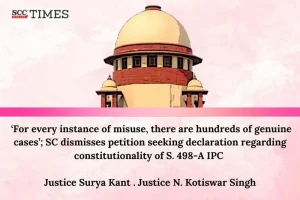Supreme Court: While considering the instant writ petition seeking directions for formulation of gender-neutral guidelines and legislation governing the filing of domestic violence and harassment complaints and for a declaration regarding the constitutionality of Section 498-A of the Penal Code, 18601 (IPC); the Division Bench of Surya Kant and N. Kotiswar Singh, JJ., dismissed the petition.
The Court opined that impugned provisions do not warrant judicial interference, because it is well-settled law that courts refrain from intervening in matters of legislative policy or mandate unless the provision in question is devoid of reasonable justification or basis; actuated by mala fides or an ulterior motive; lacking a rational nexus with the object sought to be achieved; or in violation of Fundamental Rights or any other constitutional provision.
The Court said that while it is true that instances of misuse have emerged over time, occasionally with the intent to harass families or extort money; however, such concerns by themselves, are rarely sufficient to warrant striking down a statutory provision or diluting its effect. The Court explained that it has often held in the past that that the mere possibility or occasional misuse of a legal provision does not render it constitutionally infirm, either procedurally or substantively. Even in the context of Section 498-A, the Court has reiterated that while misuse must be guarded against, the provision cannot be trivialized or undermined merely because it has, in some instances, been invoked unscrupulously. “However, this Court has also cautioned that it is not to be treated as a tool to prank assistance or as a means to ‘cry wolf’”.
The Court explained that Section 498-A of the IPC was prompted by the widespread and deeply entrenched exploitation of women through traditional practices such as the dowry system. The Legislature recognized the pressing need for a specific legal provision to address the grave suffering inflicted upon married women as a result of dowry-related offences and cruelty, which had become a pervasive social menace in Indian society. “The Legislature, in its wisdom, has continued to retain this provision over the decades, presumably in recognition of the persistent and deep-rooted nature of the underlying social malaise”.
The Court explained that in assessing the constitutionality of such penal provisions, it becomes imperative to strike a delicate balance. Section 498-A serves a constitutionally sound objective. It is aimed at protecting a vulnerable section of society that often requires legal support and institutional safeguards to shield them from systemic abuse and exploitation. Furthermore, the impugned provisions were enacted in furtherance of the principle of positive discrimination envisaged under Article 15 of the Constitution which expressly empowers the State to make special laws for the protection and advancement of women, children and other disadvantaged groups.
The Court further pointed out that the argument regarding the alleged misuse of the provisions is vague and unsubstantiated. No definitive opinion on such claims can be rendered in the exercise of the Court’s writ jurisdiction under Article 32 of the Constitution. “It is sufficient to observe that such assertions, if raised, must be assessed on a case-to-case basis by the appropriate judicial forum. We emphasize a case-to-case approach because matters of this nature often involve intricate and layered complexities”.
The Court took note of the growing discourse highlighting instances where the provision may have been misused. However, it must be borne in mind that for every such instance, there are likely hundreds of genuine cases where Section 498-A has served as a crucial safeguard for victims of domestic cruelty. The Court also came down heavily on individuals, who emboldened by the rising fervour to dismantle such protective provisions, have gone so far as to publicly share videos depicting the exchange of dowry; which is not only unlawful but also indicative of the entrenched nature of the very evil Section 498-A, IPC seeks to combat.
“As a Constitutional Court and the apex judicial body of the country, we (Supreme Court) bear the solemn responsibility of safeguarding justice for our entire population”.
The Court in its concluding remarks emphasised that the harsh truth is that dowry continues to persist as a deeply entrenched social evil, prevalent across vast sections of the country. A significant majority of such cases go unreported, with countless women compelled to endure injustice in silence. This underscores the continuing need for legal provisions such as Section 498-A which serve as vital instruments of protection and redressal for those most vulnerable.
[Janshruti (People’s Voice) v. Union of India, DIARY NO.2152/2025, decided on 15-4-2025]
Advocates who appeared in this case :
Ms. Shashi Kiran, Sr. Adv. Ms. Sadhana Sandhu, AOR Dr. Satish Chandra, Adv. Ms. Sangeeta Bhalla, Adv. Ms. Ashna Singh, Adv. Mr. Vishal Singh Chandel, Adv. Ms. Anju Sen, Adv. for the petitioners
Buy Constitution of India HERE
Buy Penal Code, 1860 HERE
1. Now Section 84 of the Bharatiya Nyaya Sanhita, 2023

